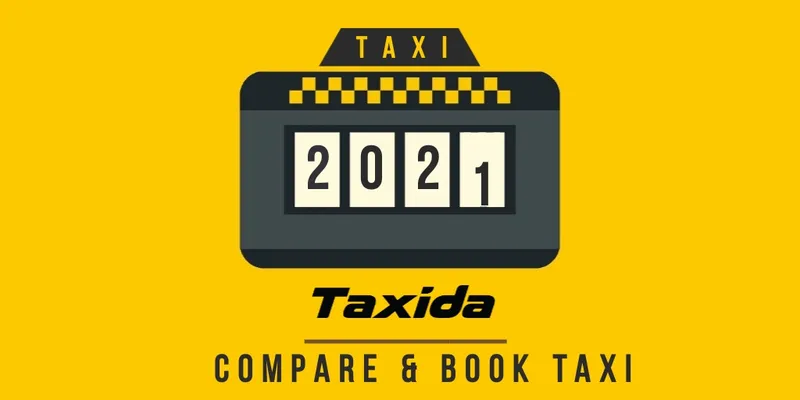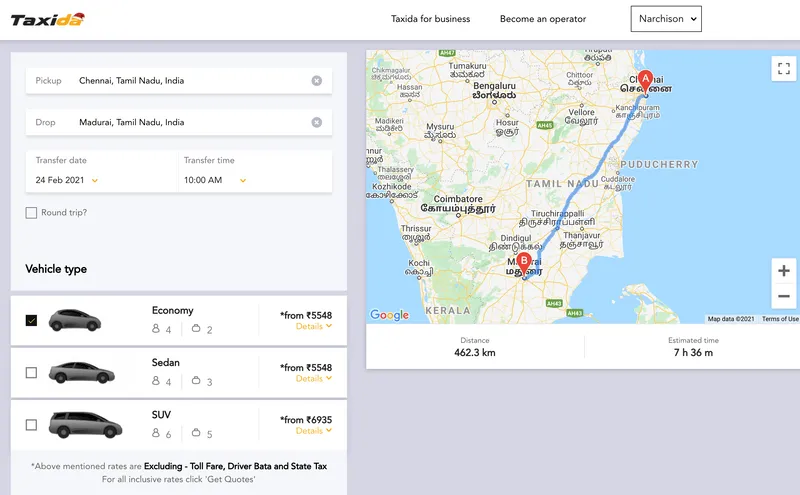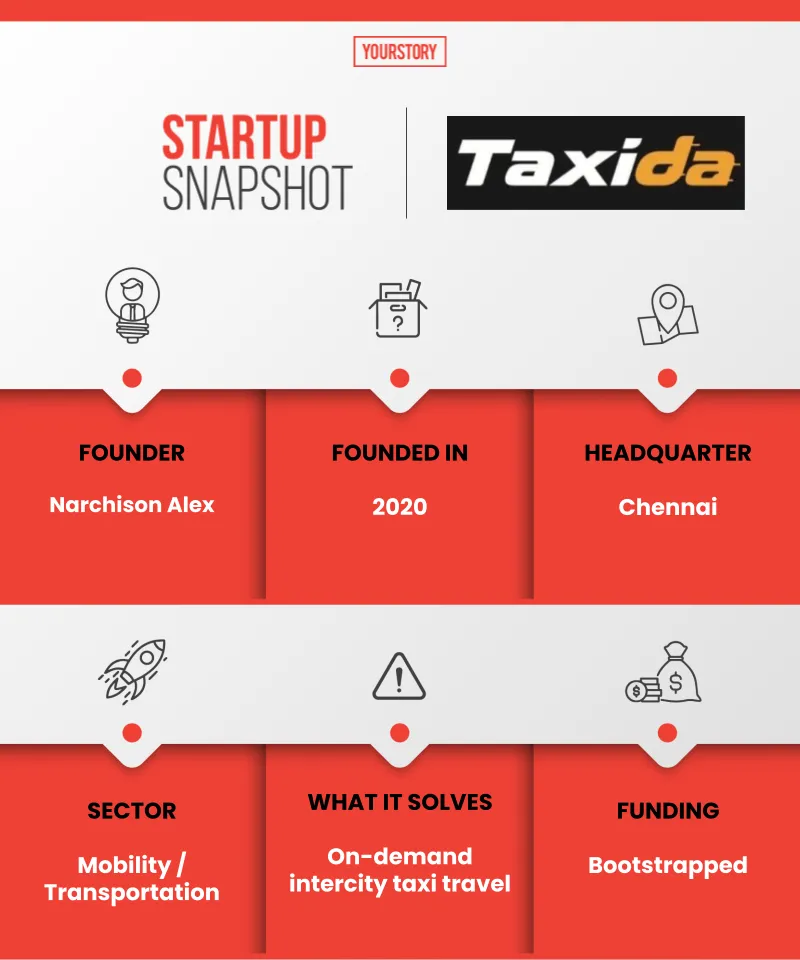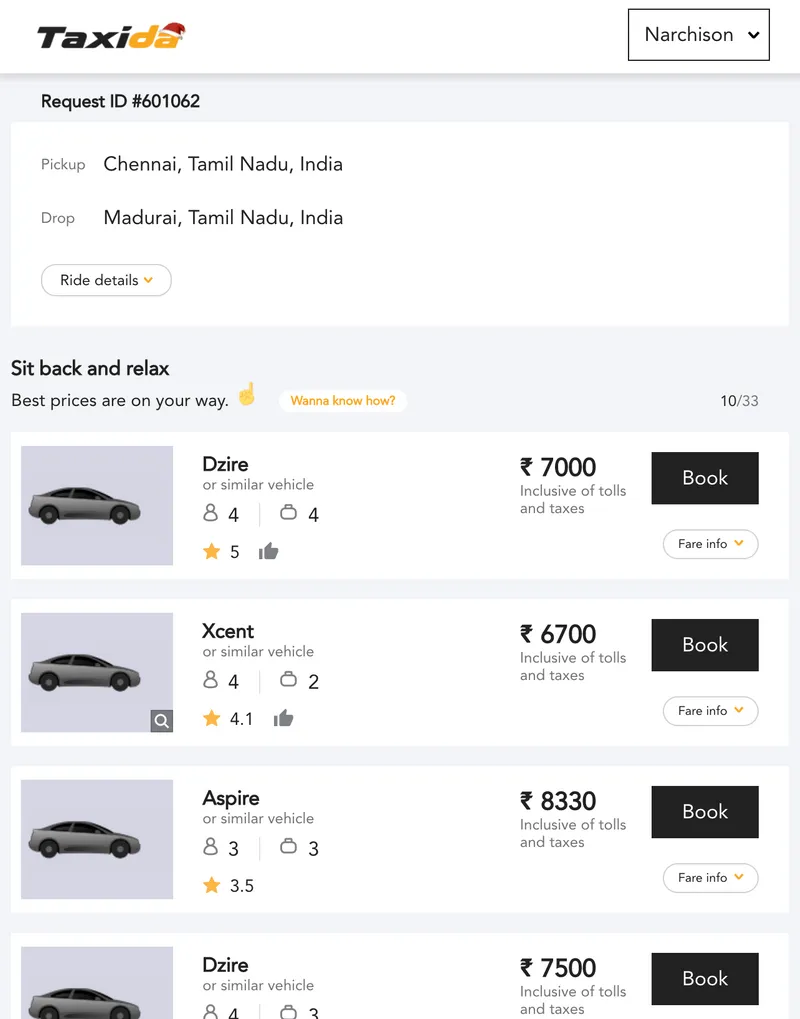Trivago for taxis? This startup is solving intercity travel in Tamil Nadu with smart tools
Chennai-based taxi marketplace Taxida launched in the lockdown to ease intercity trips. The startup is targeting a gross booking value of $3.2 million, riding on the renewed interest in outstation travel.
Rosario Narchison Alex had the entrepreneurial genes right from his college days when he would collect and sell things from seniors to juniors in the hostel. It was, what he calls, “word of mouth entrepreneurship”, and helped cover his hostel expenses.
Later, after graduating, he started and shut down a bunch of ventures from mobile recharges to delivery of home-cooked food, and also did a stint at a Chennai IT firm.

Rosario Narchison Alex, Founder and CEO, Taxida
During his tenure at a mobility startup in the UK, which had an R&D team in Chennai, Narchison identified gaps in the outstation taxi travel space. Finally, in 2019, he quit his job to work on , which was launched in early 2020.
Taxida is an on-demand marketplace and booking platform that connects travellers with a variety of unorganised taxi service providers — airport taxis, local taxis, intercity taxis, zero-emission taxis, and even robotaxis in future.
Riders can enter their travel requirements (pick-up/drop/one-way/round trip), and get real-time price lists from over 35 taxi operators in South India. Taxida presents an all-inclusive quote, which includes tolls and taxes, and has no hidden prices.
So, the price you see is the price you pay.

Chennai-based Taxida services 37 districts in Tamil Nadu
Problem it solves in a fragmented market
The Chennai-based startup’s goal is to make intercity cab booking simpler, quicker, and cheaper than Ola, Uber, and other organised players out there.
“Our research in Chennai, Bengaluru, and other parts of South India showed that most outstation taxis charge double for even one-way trips, and the customer has no option but to pay,” Co-founder and CEO Narchison tells YourStory.
He further explains,
“Some smaller players do one-way drops but they are fragmented and the trips are coordinated on WhatsApp. Sometimes drivers don’t show up, and there’s no way to track them. There was no single player to connect all these cabs.”
And that was the opportunity Taxida went after.

Taxida has completed 620+ outstation bookings in 8-9 months
Taxida's goal is to provide small taxi operators tech-enabled tools to help them compete with the bigger players, and build quality control mechanisms to deliver reliable rides and safe travels during a pandemic.
The platform aggregates bookings, vehicle fleet, drivers, ride-tracking, and so on. Each taxi service gets a driver app, a listing page, and an operator backend, which lets them manage drivers, vehicles, rides, locations, and upcoming bookings.
Narchison elaborates,
“We give them tools to run their business on our platform, and we also manage their real-time price quotes. Every taxi service gets a Google My Business-like page within our website, and customers can view reviews and ratings.”
A Trivago for local taxis then? “Yes, you could call it that,” says the founder.

Taxida driver app lets local taxi operators manage fleets, bookings, trips, etc.
Early growth and operations
The platform went live in May in the middle of a stringent nationwide lockdown, and has helped many travellers stuck at various places. It also facilitated permissions and e-passes from the government for smooth travels.
Between May 2020 and January 2021, Taxida has completed 620+ outstation bookings, with an average ticket size of Rs 3,000.
It currently manages a taxi fleet of 125-odd vehicles that can service 37 districts of Tamil Nadu, and intercity travel from Chennai to Bengaluru.

Infographic: YS Design
The founder shares,
“When we launched in the lockdown, traffic was low, but there were many requests. We were doing intercity e-passes for 10 vehicles a day, and then 200-300 vehicles a month. We couldn’t take all the trips but the interest is high.”
Taxida charges a direct commission off the operators listed on its platform as well as pockets 10 percent of the booking value per trip. Add to that, operators pay a SaaS-like subscription fee for tools they opt for.
Future roadmap and taxi market
Riding on the renewed interest for intercity travel as the pandemic restrictions slowly come off, Taxida expects to grow rapidly in 2021.
It has set itself a target of 14,000 trips by the end of the year, and plans to onboard 900 taxi operators by then. The startup is also looking to expand its district-wise and intercity reach, as well as launch new tools for taxi operators.
Taxida’s Gross Booking Value (GBV) has touched nearly $27,500. The startup wants to grow GBV to $3.2 million by the end of 2021.

Intercity taxi travel is a $12 billion market in India
Narchison says, “We’re looking to raise seed funding of $500,000 to add more interior routes and tourist spots in Tamil Nadu, and strategically tie up with travel operators in Hyderabad, Tirupati, Trivandrum, and Cochin.”
Further, Taxida plans to go deeper into Tier-II and III markets that “run under the radar”. In Tamil Nadu alone, the intercity taxi market is estimated to be Rs 72 crore, says the founder.
Overall, in India, intercity taxi travel is a $12 billion market, according to India Angel Network (IAN). More than 90 percent of this is unorganised.
Narchison sums up the opportunity by saying, “No one has clear data about players operating there [small towns], but they have their fleets full. That is going to be the new market, we will slowly penetrate and scale up in those areas.”
Edited by Saheli Sen Gupta










